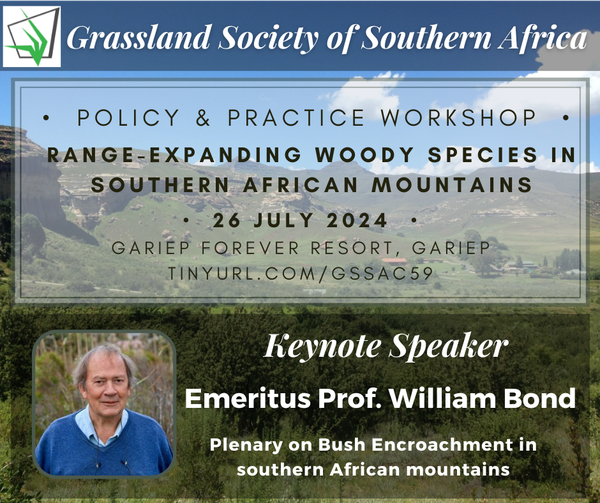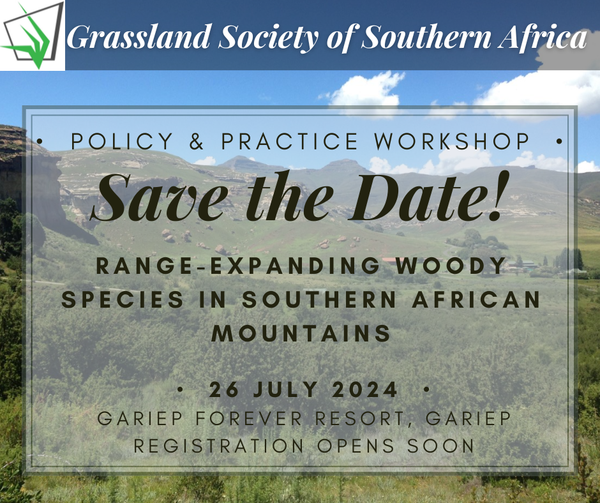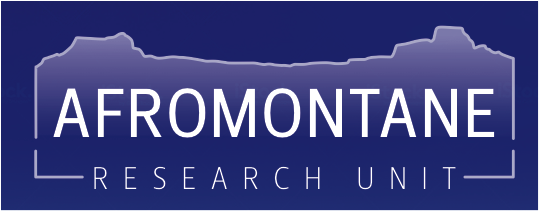Policy and Practice Workshop
POLICY AND PRACTICE WORKSHOP
26 JULY 2024
Woody range-expanding species in southern African mountains: Trends, Predictions & Mitigations
Policy and Practice Workshop

Policy and Practice Workshop
Why are (were) our upland grasslands tree-less?
William Bond, Emeritus Professor, Biological Sciences, University of Cape Town
Southern African upland vegetation is dominated by extensive grasslands. They contrast with savannas at lower elevations and Karoo shrublands in more arid climates. The existence of these montane grasslands is an unresolved biogeographic puzzle. Why are there no trees? And why are trees beginning to invade these grasslands? In this talk I discuss ideas about the absence of trees and attempts to test them. Upland climate with more frost and shorter growing seasons, human deforestation, frequent fire, hostile soils have all been considered. Tests at diverse scales include correlations, dynamic vegetation models (DVMs), field and laboratory experiments. Recent studies suggest that increasing atmospheric CO2 over the last half century has been a major factor tipping the balance to favour woody plants. However factors accounting for the 'savanna treeline' pattern and dynamics remain at least as enigmatic as the global treeline with much to be discovered.
Policy and Practice Workshop
Overview
Recent decades have seen the rapid range-expansion and densification of woody native and non-native species in certain southern African mountains, with consequent challenges to rangeland management, livelihoods, fire regimes, species conservation, catchment management and water budgets, and grassland / open habitat conservation targets.
Hosted by the Grassland Society of Southern Africa, the Policy & Practice Workshop will provide a forum for scientists, policy makers, practitioners, and land managers to interactively share experience and knowledge on the challenging aspects of range-expanding woody species in mountainous contexts. In particular, the Workshop will be showcasing the results of the South African component of the EU Biodiversa project "Mechanisms underlying the success and impacts on biodiversity and ecosystem functioning of range-expanding species under climate change" or "RangeX", which has used the northern Maloti-Drakensberg as a case study for potential future woodiness scenarios under climate change as well as current management scenarios.
Policy and Practice Workshop
Facilitators
The workshop will be facilitated by Prof. Ralph Clark (Director: Afromontane Research Unit, University of the Free State) and Dr Grant Martin (Deputy-Director: Centre for Biological Control, Rhodes University). Ralph is the South African Principal Investigator for "RangeX" and has wide-ranging research and travel experience across southern African mountains. Grant has extensive experience in research and management on problem woody species in higher elevation regions in southern Africa. They represent competent teams who will share on specific aspects of their research and experience. Additional contributions are also welcomed, and the facilitators can be contacted at clarkvr@ufs.ac.za and g.martin@ru.ac.za.
Policy and Practice Workshop
Format
The workshop will be a combination of presentations and interactive discussions. A pre-determined list of priority stakeholders will be invited to attend in person, with additional in-person spaces available until a cap is reached. The Workshop will also be hybrid, so that participation can also take place virtually.
Policy and Practice Workshop
Acknowledgements
The workshop will be financially supported by the EU Biodiversa programme through the "RangeX" lead organisation, ETH Zurich (Switzerland).
Policy and Practice Workshop

Policy and Practice Workshop

Policy and Practice Workshop

Policy and Practice Workshop

Policy and Practice Workshop

Policy and Practice Workshop
For more information contact the administrator at info@grassland.org.za

